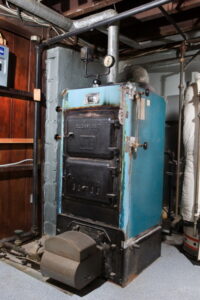How long does a furnace last? Does my furnace need to be repaired? Is it worth repairing? How can I tell when to start thinking about getting a new furnace? What kind of furnace should I get? If you own a home, these questions will come up sooner or later. We’d like to give you some tips for determining whether it’s time to replace your furnace and deciding what to replace it with.
Furnace Life Expectancy
If you have a gas-burning furnace, you shouldn’t expect it to survive much beyond fifteen years. An electric furnace is more likely to make it to the age of twenty. There are two details you should keep in mind, though.
The first is that these life expectancy estimates are based on furnaces that have been professionally maintained every year. Lack of maintenance considerably shortens furnace life. The second is that most of the repair needs of a furnace’s lifetime will happen during the last few years that it’s operational.
This means that although you might be able to keep your twelve-year-old gas furnace running for a few more years, you should expect more inconvenience and cost during those years.
Get the Right Furnace Size for Your Home
Choosing a furnace that’s too large or too small can cause inefficiency, higher energy bills, and uneven heating. A professional load calculation takes into account your home’s size, insulation, and layout to ensure optimal performance. Proper sizing also prevents unnecessary wear and tear on the system, extending its lifespan.
Tailoring Furnace Options to Local Conditions
In areas like Houston, Texas, unpredictable weather and high humidity can influence furnace performance. Selecting systems with features like humidity control or corrosion-resistant components ensures longevity and efficiency. Consulting with local HVAC professionals helps you choose a furnace suited for your home’s specific environment.
Furnace Replacement Considerations
In addition to the age of the furnace and how well it has been maintained, current repair needs should be a major part of the decision to replace it. Does it require a major repair right now? If you invest the money in that major repair, will you still have a furnace that’s quite close to the end of its life? Perhaps you’d be better off putting that money toward a new furnace.
Another consideration is the season. During the summer, you have plenty of time to consider replacement options. You can schedule furnace installation for a time when you won’t be stressed about leaving your home without heat for hours during the transition from your old furnace to your new one. If you think your furnace might not last the winter, you might prefer to avoid the inconvenience of having it break down completely during a cold snap in January.
Flexible Financing and Replacement Incentives
Replacing a furnace can be a significant investment. To ease the process, homeowners can explore financing options like low-interest loans or zero-down payment plans. Additionally, many HVAC companies offer seasonal discounts and rebates on energy-efficient systems, helping you save on both upfront and long-term costs.
Save More with Financing and Rebates
Replacing a furnace is a major investment, but flexible financing options and manufacturer rebates can ease the financial burden. Look for energy-efficient models that qualify for utility company rebates or tax credits to maximize your savings.
Gas Furnaces
Although they don’t last as long as electric furnaces, gas furnaces do have several advantages. They are less expensive to purchase, and in most cases, they’re less expensive to run. Natural gas tends to be a bit cheaper than electricity. The potential downsides are that installation is a somewhat lengthier process since you need to connect gas lines and that any gas-burning appliance does pose the possibility of safety hazards, though those can be mitigated with regular maintenance and good carbon monoxide detectors.
Electric Furnaces
The greater expense of purchasing an electric furnace may be absolutely worth the investment over time, as they do tend to last several years longer than gas furnaces. Electricity is a bit more expensive than gas, but if you have solar panels, it could turn out to be less expensive.
If you don’t have access to gas lines through a local utility, having your home connected can be inconvenient and costly or, depending on your location, impossible. Electric furnace installation is quicker and less complicated. And of course, with no fuel burning, there is no carbon monoxide hazard.
If you think furnace replacement in Houston, TX is on the horizon for you, get more information about your options before you need to use it.
Reach out to Cool Care Heating and Air Conditioning, The Best Care for Your Air.





